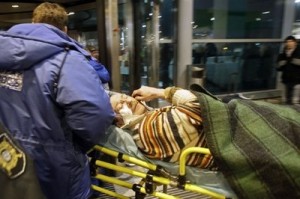MOSCOW (AP) — An explosion ripped through the international arrivals hall at Moscow’s busiest airport on Monday, killing at least 31

people and wounding up to 145 as it coated the terminal in blood. The Russian president called it a terror attack.
The mid-afternoon explosion at Domodedovo Airport may have been caused by a suicide bomber, the state RIA Novosti news agency reported. Other Russian media reports said the bomb was packed with shrapnel, screws and ball bearings.
The terminal at Domodedovo Airport was engulfed by smoke and splattered with body parts. Amateur video posted on YouTube showed a pile of bodies on the floor, and other bodies scattered around. Luggage lay strewn across the ground and several small fires burned. A dazed man in a suit pushed a baggage cart through the carnage.
“From the preliminary information we have, it was a terror attack,” President Dmitry Medvedev told officials in a televised briefing, saying it was clear that security had been breached.
He immediately ordered authorities to beef up security at Moscow’s two other commercial airports and other key transport facilities. Medvedev also postponed his own planned departure Tuesday for the World Economic Forum in Davos, Switzerland, where he was to give the opening address on Wednesday.
In Washington, President Barack Obama condemned the `outrageous act of terrorism’ in Moscow.
No one immediately claimed responsibility for the explosion. Chechen militants have claimed responsibility for previous terror attacks in Moscow, including a double suicide bombing on the subway in March 2010 that killed 40 people and wounded more than 100.
Large-scale battles in Chechnya ended years ago, following two devastating wars between Russia and the region’s separatists, but Islamic militants have continued to carry out suicide bombings and other attacks. Most of the attacks have been in Chechnya and other predominantly Muslim provinces in the southern Caucasus region, but some have targeted Moscow, including its subways, buses and trains.
Car rental agent Alexei Spiridonov, 25, was at his desk when the blast struck about 100 yards (meters) away.
“The explosion was so strong that it threw me against the wall,” he told The Associated Press outside the airport. “People were panicking, rushing out of the hall or looking for their relatives. There were people just lying in blood.”
Yelena Zatserkovnaya, a Lufthansa official, said she was a similar distance away. “There was lots of blood, severed legs flying around.”
Airport workers were using baggage trolleys to cart out the injured, she said.
Domodedovo Airport spokeswoman Yelena Galanova said 35 people were killed. The Emergencies Ministry said 31 people were killed, 51 hospitalized with injuries and 94 were given medical treatment. The discrepancy could not immediately be explained.
Eurocontrol, the European air traffic control agency in Brussels, said Domodedovo was briefly closed to air traffic immediately after the blast, but soon reopened.
Sergei Lavochkin, who was waiting in the arrivals hall for a friend to arrive from Cuba, said emergency teams carried bloodied people out of the terminal.
“I heard a loud bang, saw plastic panels falling down from the ceiling and heard people screaming. Then people started running away,” Lavochkin told Rossiya 24 television.
Mark Green, a British Airways passenger who had just arrived, told BBC television he heard the huge explosion as he left the terminal.
“Literally, it shook you,” he said. “As we were putting the bags in the car a lot of alarms … were going off and people started flowing out of the terminal, some of whom were covered in blood.”
“One gentleman had a pair of jeans on that was ripped and his thigh from his groin to his knee was covered in blood,” he added.
Green said thousands of people were in the terminal at the time of the blast.
Hours after the blast, passengers arriving for their flights lined up outside waiting to pass through metal detectors that had been installed at all entrances. At least 20 ambulances and 10 fire trucks remained outside.
Built in 1964, Domodedovo is located 26 miles (42 kilometers) southeast of the center of Moscow and is the largest of the three major airports that serve the Russian capital, serving over 22 million people last year. It is generally regarded as Moscow’s most up-to-date airport, but its security procedures have been called into question.
In 2004, two suicide bombers were able to board planes at Domodedovo by buying tickets illegally from airport personnel. The female bombers blew themselves up in mid-air, killing all 90 people aboard the two flights.
Some 77 airlines now offer regular flights to Domodedovo, serving 241 international and national routes, according to airport’s website.
The airport insists that security is one of its top priorities, claiming on its website that its “cutting-edge operations technology guarantees the safety of passengers’ and guests’ lives.”
NATO Secretary-General Anders Fogh Rasmussen said he was “deeply disturbed” by the reported terror attacks.
“I strongly condemn it,” he said on Twitter. “NATO and Russia stand together in the fight against terrorism.”







